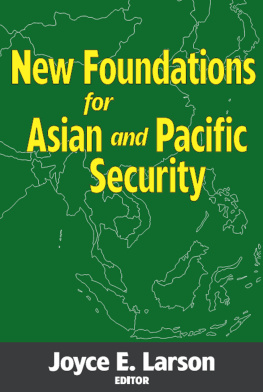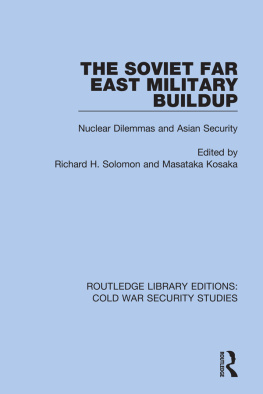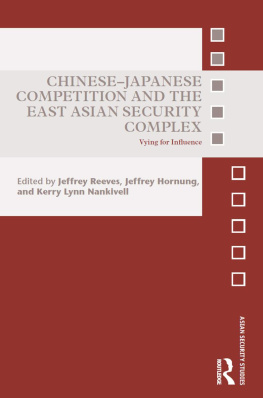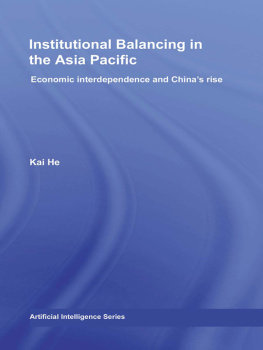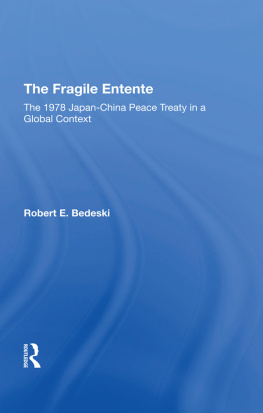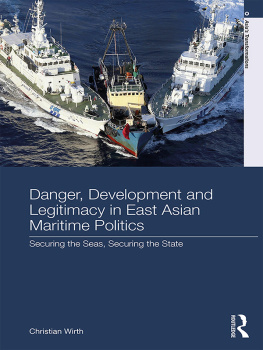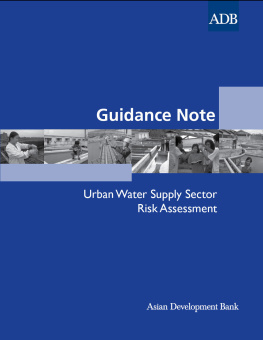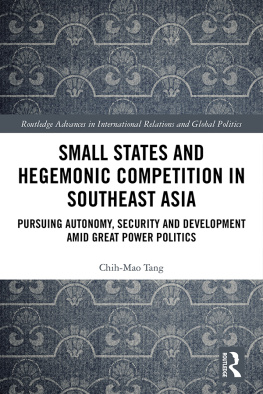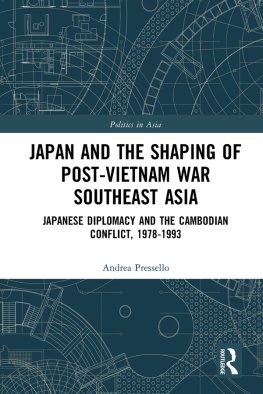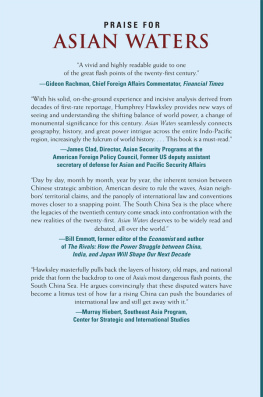First published 1980 by Transaction Publishers
Published 2017 by Routledge
2 Park Square, Milton Park, Abingdon, Oxon OX14 4RN
711 Third Avenue, New York, NY 10017, USA
Routledge is an imprint of the Taylor & Francis Group, an informa business
Copyright 1980 by National Strategy Information Center, Inc.
All rights reserved. No part of this book may be reprinted or reproduced or utilised in any form or by any electronic, mechanical, or other means, now known or hereafter invented, including photocopying and recording, or in any information storage or retrieval system, without permission in writing from the publishers.
Notice:
Product or corporate names may be trademarks or registered trademarks, and are used only for identification and explanation without intent to infringe.
Library of Congress Catalog Number: 2013025236
Library of Congress Cataloging-in-Publication Data
New foundations for Asian and Pacific security / Joyce E. Larson, editor.
pages cm
Papers and proceedings of the Conference on New Foundations for
Asian and Pacific Security, held at Pattaya, Thailand,
December 12-16, 1979.
Includes bibliographical references.
ISBN 978-0-87855-846-9
1. Asia--Strategic aspects--Congresses. 2. Pacific Area-Strategic aspects--Congresses. 3. Security, International--Asia--Congresses. 4. Security, International--Pacific Area--Congresses. 5. National security--Asia--Congresses. 6. National security--Pacific Area--Congresses. I. Larson, Joyce E., editor of compilation. II. Conference on New Foundations for Asian and Pacific Security (1979 : Ban Phatthaya, Thailand)
UA830.N48 2013
355.03305--dc23
2013025236
ISBN 13: 978-0-87855-846-9 (pbk)
For most of the nations of the Asian/Pacific region, the post-World War II decades have been a period of significant economic growth and progress toward the development of viable and stable political institutions. As diplomatic interactions have become ever more complex, and as trade relations among the various countries have expanded, both the economic vitality and the geo-political importance of the region have gained increasing recognition.
Continued regional progress is dependent, in part, on the establishment and maintenance of conditions of domestic and regional security which allow attention to be focused on the requirements of orderly political and economic development. The latter half of the 1970s, however, brought changes in the international climate and in the regional balance of power which, when viewed together, carry disturbing implications for the prospects for peace and stability in the Asian/Pacific area. These changes include:
. The perceived reduction of the American commitment to Asian security; the actual reduction of U.S. military strength deployed in the area; and the uncertainties characteristic of U.S. security relations with such major allies as Japan, the Republic of Korea, and the Philippines arising from American neglect or policy shocks.
. The rapid and extensive expansion of Soviet military power in East Asia and the Indian Ocean area, and the consolidation of Soviet military and political influence in Indochina.
. The victory of communist forces in Vietnam, Laos, and Kampuchea; the emergence of Vietnam as the strongest military power in Southeast Asia; and the current Vietnamese domination of the entire Indochinese peninsula.
. The intensification in East Asia of the Sino-Soviet conflict, and the outbreak of actual hostilities between the Peoples Republic of China (PRC) and Soviet-backed Vietnam.
. The emergence of strained political and economic relations between and among the regions developed and developing nations arising from various pressures to restructure trade policies and tariff regulations.
The Asian/Pacific area has become a crucial arena of great power rivalry, for it is in this region that the interests and ambitions of the U.S., the Soviet Union, Japan, and the PRC intersect and often clash. At least partially in response to these realities, new or strengthened alignments or relationshipsmost of them tentative and not yet fully formedare developing in the region, including the Sino-American and Sino-Japanese rapprochements, growing unity among the Association of Southeast Asian Nations (ASEAN) states, and improved relations between ASEAN and the PRC. Whether these developments will serve to modify significantly the currently heightened uncertainties, tensions, and strains in the region remains to be seen.
Careful consideration of these varied and complex concerns has led a number of observers to conclude that todays international environment requires greater emphasis on security-related matters in Asia and the Pacific Basin. Acting upon this conviction, the National Strategy Information Center and five cooperating organizations co-sponsored a conference on New Foundations for Asian and Pacific Security at Pattaya, Thailand in December 1979. This book contains the addresses, conference papers (some in slightly altered form), and committee reports which constituted the formal substantive aspects of the conference.
The organization of any conference requires often difficult decisions with respect to the range of issues to be approached, the formulation of specific topics, and the choice of participantsi.e., the determination of parameters which are neither too broad nor too narrow and which serve to define a framework for effective discussion of the matters at hand. In the view of the organizers and participants of the Pattaya conference, an adequate approach to security concerns must include attention to the political, economic and military dimensions, and the reader will find this recognition of the complex and multi-dimensioned nature of what comprises security reflected both in the books organizational format and in its substantive analyses.
Conference participants included public- and private-sector leaders and scholars from eleven nationsJapan, the Republic of Korea, the Republic of China, the Philippines, Singapore, Indonesia, Malaysia, Thailand, Australia, New Zealand, and the United Stateslocated in the area broadly referred to as Asia and the Pacific Basin or, alternatively, the Asian/Pacific region. It is obvious that not all nations geographically situated in this region were represented at the conference. For the purposes of the Pattaya meetings, it was determined that the countries invited should share certain common foundations and outlooks, as reflected in their non-communist political and economic systems, general friendliness toward one another, and demonstrated commitment to cooperative regional endeavors. There exist a variety of approaches to the establishment of this particular parameter, and future conferences may well involve a different configuration of participating states.
It is the hope of the National Strategy Information Center that the essays contained in this volume will serve to focus attention on crucial issues of security and stability in an area of the world which has moved increasingly toward the center of international politics and economic relations. We wish to take this opportunity to offer our appreciation to the conference co-sponsors, the conference participants, the staff of the Thai Oil Refinery Company in Bangkok for their administrative assistance, Dr. Thanat Khoman for his special help, and the Institute of Southeast Asian Studies in Singapore for its cooperation in publishing an Asian edition of this book.

